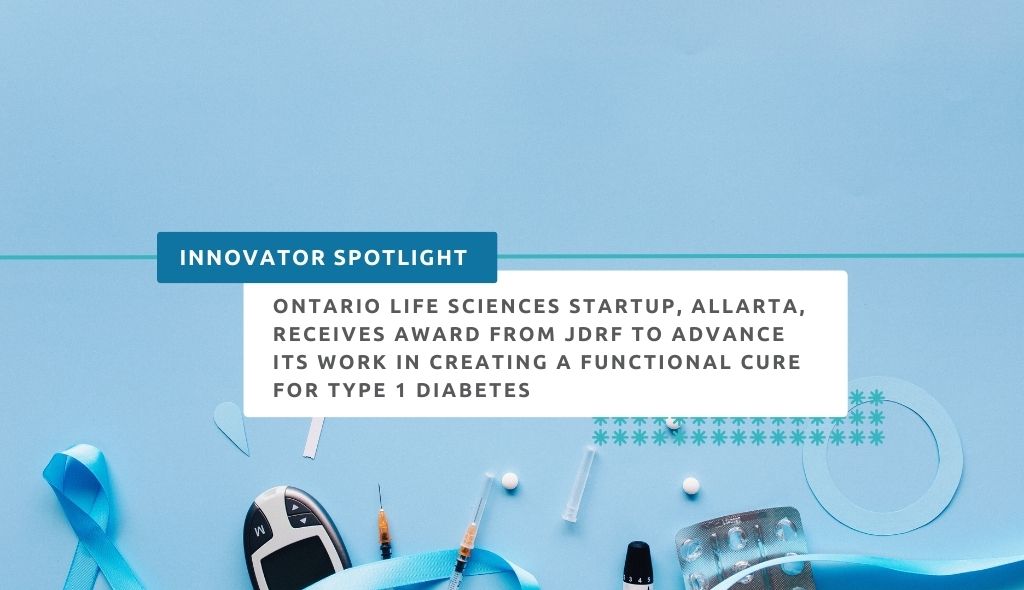Hamilton, ON, Canada and New York, NY – October 2, 2023 – Allarta Life Science, the Hamilton-based regenerative medicine company using novel hydrogels to enable cell-based therapies for type 1 diabetes (T1D), today announced it has received an award from JDRF, the leading global T1D research and advocacy organization, that could amount to US$800,000 upon completion of research and development milestones.
Allarta, co-founded in 2019 by McMaster Chemistry Professor Dr. Harald Stover and Maria Antonakos, uses polymer science to advance cell therapies for T1D. Founding investors include McMaster University, Mark Krembil and Ian Delaney.
The award will directly fund Allarta’s ongoing work to increase durability and avoid the need for systemic immune suppression in current islet and beta cell transplantations to cure T1D.
Specifically, Allarta has developed a hydrogel platform that offers immune protection for transplanted beta cells. Allarta’s competitive advantage lies in its synthetic hydrogels designed to allow good metabolic connection of transplanted cells while protecting them from the hosts’ immune system.
The goal of this program is to conduct key pre-clinical studies in porcine models using islets as well as stem cell-derived beta cells, both without systemic immunosuppression.
Allarta co-founder, Dr. Harald Stover said, “Enabling cell therapies for Type 1 Diabetes without immune suppression is one of the most promising applications for Allarta’s hydrogel technologies. The JDRF award will help us advance these therapies further towards the clinic.”
“Protecting transplanted cells from immune rejection without the use of chronic systemic immunosuppression remains one of the primary barriers to the broad application of islet cell therapies to cure type 1 diabetes. Addressing it is a key priority for JDRF so that these therapies can be fully implemented,” said Jaime Giraldo, Ph.D., Associate Director of Research at JDRF. “Allarta’s approach is well-aligned with our research strategy, and we look forward to working with them on testing the ability of these unique materials to protect implanted insulin-producing cells following transplantation.”
About Allarta
Allarta Life Science is a Canadian-based regenerative medicine company with platform technology to deliver curative cell and stem cell therapies. Built on 30+ years of foundational expertise, Allarta’s proprietary platform is designed to overcome immune rejection, prevent cell escape and safely deliver cell and stem cell therapies. Our lead product is a cell therapy focused on type 1 diabetes (T1D) as a first indication. Allarta was co-founded in 2019 by Dr. Harald Stover, a renowned polymer scientist, and Maria Antonakos.
About JDRF
JDRF’s mission is to accelerate life-changing breakthroughs to cure, prevent and treat T1D and its complications. To accomplish this, JDRF has invested more than $2.5 billion in research funding since our inception. We are an organization built on a grassroots model of people connecting in their local communities, collaborating regionally and globally for efficiency and broader fundraising impact, and uniting on a global stage to pool resources, passion, and energy. We collaborate with academic institutions, policymakers, and corporate and industry partners to develop and deliver a pipeline of innovative therapies to people living with T1D. Our staff and volunteers throughout the United States and our five international affiliates are dedicated to advocacy, community engagement, and our vision of a world without T1D. For more information, please visit jdrf.org or follow us on Twitter (@JDRF), Facebook (@myjdrf), and Instagram (@jdrfhq).
About Type 1 Diabetes (T1D)
T1D is an autoimmune condition that causes the pancreas to make very little insulin or none at all. This leads to dependence on insulin therapy and the risk of short or long-term complications, which can include highs and lows in blood sugar; damage to the kidneys, eyes, nerves, and heart; and even death if left untreated. Globally, it impacts nearly 9 million people. Many believe T1D is only diagnosed in childhood and adolescence, but diagnosis in adulthood is common and accounts for nearly 50% of all T1D diagnoses. The onset of T1D has nothing to do with diet or lifestyle. While its causes are not yet entirely understood, scientists believe that both genetic factors and environmental triggers are involved. There is currently no cure for T1D.
Contact:
Maria Antonakos,
Allarta Life Science
[email protected]
1.226.339.4890
Alex Brown
Ramsay Inc.
[email protected]
1.416.903.5542






